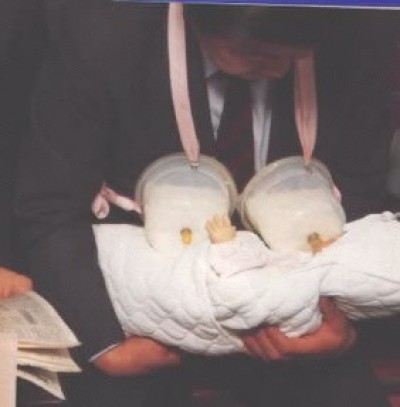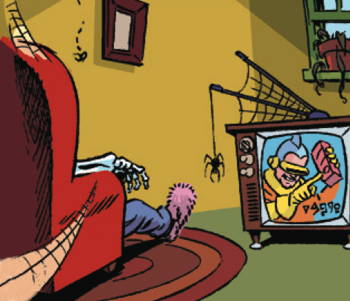November 2015
November 30, 2015
News of the Weird (November 29, 2015)
News of the WeirdWeirdnuz.M451, November 29, 2015
Copyright 2015 by Chuck Shepherd. All rights reserved.
WEIRDNUZ.M451 (News of the Weird, November 29, 2015)
by Chuck Shepherd
Lead Story
It’s Snot Hygienic: The manager of the agency in Louisville, Ky., responsible for, among other things, development planning, zoning changes, and historic landmarks revealed in November that his headquarters has a “boogers” problem and ordered users of the third-floor men’s room to stop hocking them onto the walls adjacent to the urinals. According to an internal memo cited by InsiderLouisville.com, Metro Planning and Design manager Joe Reverman called the mucus build-up “a very serious situation” and had his executive administrator issue signs instructing restroom users on the basics of proper disposal of “anything that comes out of or off a person’s body.” [InsiderLouisville.com, 11-18-2015]
Great Art!
The 1968 Cy Twombly “blackboard” painting sold for $70.5 million at New York City’s Sotheby’s auction in November (higher than experts’ estimate of $60 million). The painting consists of six horizontal lines of continuous circular swirls (white chalk on a “blackboard”)--perhaps the same swirls that might be made by an extremely bored, aggressive first-grader given a supply of chalk and the absence of the teacher. [Artnet News, 11-11-2015]
The Baltimore-based “experimental music” creators, Matmos, released their second album, “Ultimate Care II,” consisting entirely of “music” made by a Whirlpool washing machine (the “Ultimate Care II” model). According to a November report in Time magazine, the machine’s 38-minute wash cycle will be “sampled and processed” to lighten the original sound. (Matmos previously “played” canisters of helium on stage at Radio City Music Hall and a cow’s uterus at the San Francisco Art Institute.) [Time.com, 11-9-2015]
Cultural Diversity
In an enterprise somewhat resembling “American Idol,” amateur performers in China become self-supporting online not by soliciting money directly, but through virtual gifts from enthralled fans, with performers getting a cut of each sale. Beijing’s YY.com hosts original performances, and two of the show’s favorites, “Mr. Earth and Ms. Cloud,” earned the equivalent of about $160,000 last year from their universe of 1.8 million fans (according to a November Wall Street Journal report). In an ancillary industry (led by 9158.com), hard-core fans can purchase access (think “virtual limousines,” shown “arriving” at a “concert”), giving them bragging rights. (A simple “applause” icon after a song costs about a penny.) [Wall Street Journal, 11-11-2015]
Bright Ideas
The exasperated drug enforcement chief of Indonesia told reporters in November (following confiscation of a massive quantity of methamphetamine from China) that the ordinary death penalty was insufficient for drug runners, who should instead be forced to overdose on their own shipments. Budi Waseso also mused that crocodiles would make better prison guards than humans because crocs can’t be bribed and later added tigers and pirhanas to the proposed guard roster. Even so, Waseso’s boss reiterated that the government is committed to rehabilitation over punishment. [Australian Broadcasting Corp. News, 11-13-2015] [Jakarta Globe, 11-22-2015]
New World Order
Watch Your Language: (1) Recently added to the list of words and phrases to be officially discouraged on campus, according to the University of Wisconsin-Milwaukee’s website: “political correctness.” The phrase is said to be a “microaggression” that might make some students feel uncomfortable or unsafe if they hear it or read it. (2) In November, the University of Vermont held a (voluntary) three-day “retreat” open only to students who “self-identify” as “white,” so that they can study the implications of “white privilege” in society (e.g., “what does it mean to be white?” and “how does whiteness impact you?”). [CampusReform.org, 10-21-2015] [CampusReform.org, 11-18-2015]
Government Inaction
The Queens (N.Y.) Redbird Tourist Information Center was finally ordered to close in July following an extraordinarily unsuccessful seven-year run in which, possibly, not a single tourist ever walked through the door. The New York Post, interviewing neighbors in Kew Gardens, found no one who ever saw a visitor, and the Center’s lone staff member said she recalled only lunchtime drop-ins from jury duty at the criminal court building down the block. [New York Post, 7-10-2015]
The Continuing Crisis
Marshall University (Huntington, W.Va.), seeking a “star free agent” for its medical faculty, hired neurosurgeon Paul Muizelaar in July despite controversy from his previous work at the University of California Davis. There, Dr. Muizelaar and colleagues, in a daring experiment, introduced live bowel bacteria into the brain--on lab rats--supposedly to stimulate the immune system when other remedies had faltered. However, Dr. Muizelaar, emboldened, also introduced the bacteria into brains of a man and two women who had highly malignant glioblastoma tumors (each patient having consented). However, two died within weeks, and although the third survived more than a year, UC Davis found numerous protocol violations. Dr. Muizelaar’s new supervisor told the Associated Press that he nonetheless felt lucky to land him because “not everybody wants to move to Appalachia.” [Associated Press via Charleston Gazette-Mail, 7-4-2015]
Ironies
Deputy sheriff Michael Szeliga of St. Petersburg, Fla., in Fort Lauderdale for a weekend training session in July, was to receive a commendation at the formal banquet, for exemplary DUI enforcement, presented by Mothers Against Drunk Driving. (This is News of the Weird; you’ve already guessed the outcome.) He, escorted by two fellow deputies, arrived for dinner “staggeringly drunk” (though he did not drive), according to an Internal Affairs investigation, and he was ordered to go sleep it off. (Szeliga wrote an apology and was transferred out of DUI work. Sheriff Bob Gualtieri said Szeliga was a good deputy but that the incident was “one of the most ridiculous things” he’d ever heard of.) [WFLA-TV (Tampa), 11-5-2015]
People With Issues
Social science professor Dr. Jeff Justice resigned from the faculty at Tarleton State University (Stephenville, Tex.) in October to head off an investigation into whether he supplied alcohol to students and proselytized at least one to undergo a self-mutilation practice. Justice admitted, post-resignation, that he was a devotee (since age 13) of the “Sundance” ritual, in which he would hang from a tree in his backyard by hooks connected to stakes in his bare chest and that he demonstrated it to some students but apparently interested none. He attributed the incidents to “severe depression.” (Bonus: He had won a “Faculty Excellence” award in 2015.) [Texan News Service (Tarleton State University), 10-14-2015]
Least Competent Criminals
Kaleb Alexander, 25, was shot and killed in October as he emerged from a United Dairy Farmers convenience store in Columbus, Ohio, still with his gun defiantly drawn after he had just then robbed the clerk. A Columbus police SWAT team was waiting outside the store because Alexander had robbed the store the previous two nights, as well, and somehow must have thought that the police would not catch on to his cunning robbery strategy. [Columbus Dispatch, 10-15-2015]
Recurring Themes
Are We Safe? As News of the Weird chronicled in 2010 and 2011, Iraqi police (either corrupt or sincerely unsophisticated) continued to purchase worthless bomb “detectors” to use at checkpoints in Baghdad, instilling residents with a false sense of security, with the result that hundreds of people died in supposedly safe neighborhoods. Briton James McCormick, the most successful conman-seller, is serving a 10-year sentence for the “ADE 651" (which, somehow, Baghdad police continued to buy long after the U.S. had warned of the scam). Since then, more bogus detectors have been peddled to Thailand’s and other governments. In November 2015, London’s The Independent, in a dispatch from the Egyptian resort Sharm el-Sheikh, reported that luxury hotels’ security officers are now using similar bogus detectors to reassure tourists frightened by the recent terrorism-suspected Russian plane crash in Egypt. [The Independent, 11-10-2015]
A News of the Weird Classic (March 2011)
Mental health practitioners, writing in the January [2011] issue of the journal Substance Abuse, described two patients who had recently arrived at a clinic in Ranchi, India, after allowing themselves to be bitten by cobras for recreational highs. Both men had decades-long substance-abuse issues and decided to try what they had heard about on the street. One, age 44, bitten on the foot, experienced "a blackout associated with a sense of well-being, lethargy, and sleepiness." The other, 52, reported "dizziness and blurred vision followed by a heightened arousal and a sense of well-being," and apparently was so impressed that he returned to the snake charmer two weeks later for a second bite. [Substance Abuse, January 2011]
Thanks This Week to Christine Van Lenten and to the News of the Weird Board of Editorial Advisors.
Posted By: Chuck - Mon Nov 30, 2015 -
Comments (2)
Category:
Human Resurrection Company

A new Australian company, Humai, has an ambitious goal. It wants to make people immortal. From its "vision" statement:
So, you see, they'll use "artificial intelligence," "nanotechnology," "multiple sensor technologies," and "cloning." Simple.
If this company had been founded 100 years ago, they would have used buzzwords like "electro-galvanic processes" and "radium power." And they would have had about the same chances for success as today.
via TechRadar.
Posted By: Alex - Mon Nov 30, 2015 -
Comments (6)
Category: Death
Severed Stream
You will also find Mars's artwork on this great new collection of weird fiction, a nice Xmas gift for lovers of "cosmic horror."
Posted By: Paul - Mon Nov 30, 2015 -
Comments (1)
Category: Freaks, Oddities, Quirks of Nature, Outsider Art, Surrealism, Fictional Monsters
November 29, 2015
Best Apple Butter in Oklahoma
The judges probably thought it was a bold new take on apple butter.
The Plain Speaker (Hazelton, Pa. — Oct 24, 1956)
Posted By: Alex - Sun Nov 29, 2015 -
Comments (13)
Category: Contests, Races and Other Competitions, Food, 1950s
Greatest Shoplifter Ever?


Original article here.
Posted By: Paul - Sun Nov 29, 2015 -
Comments (7)
Category: Crime, Retailing, 1980s
November 28, 2015
Gang Member Rugs
Created by artist Renato Garza Cervera out of leather, polyester, polyurethane foam, glass eyes, and paint. Cervera explains that rugs used to represent fierce creatures such as lions, tigers, or bears. So he decided to create rugs that show fierce creatures with more contemporary relevance.He goes on to say that his rugs represent "Calibanization" (as in, the character Caliban from Shakespeare's The Tempest). "It's an aesthetic consideration of collective political, social and psychological mechanisms and patterns." More info: MySanAntonio.com.


Posted By: Alex - Sat Nov 28, 2015 -
Comments (7)
Category: Art, Furniture
Follies of the Madmen #266
Posted By: Paul - Sat Nov 28, 2015 -
Comments (5)
Category: Beauty, Ugliness and Other Aesthetic Issues, Business, Advertising, Products, 1960s, Cars
November 27, 2015
More Weirdness From Japan

Found a great Top 10 Weirdest Japanese Inventions list. The Daddy Nurser isn't number 1 but it should be!
Posted By: Alex - Fri Nov 27, 2015 -
Comments (2)
Category: Inventions
Death of the Human Ostrich
1906: Robert Naysmith, the "human ostrich," died from eating too many hatpins and brass nails.Back in the day, I think there were a number of people who earned a livelihood by exhibiting themselves as human ostriches. Tough way to make a living.

(left) Topeka Daily Capital - July 17, 1906; (right) The Sketch - July 4, 1906

Saint Paul Globe - Sep 24, 1898
Posted By: Alex - Fri Nov 27, 2015 -
Comments (5)
Category: Jobs and Occupations, 1900s
Television Set for the Differently Abled
Very forward-looking and thoughtful of Westinghouse to create a TV set that aided one-handed people. Of course, nowadays you only need one finger (on the remote) to tune!
Posted By: Paul - Fri Nov 27, 2015 -
Comments (3)
Category: Television, Advertising, 1950s, Differently Abled, Handicapped, Challenged, and Otherwise Atypical
| Get WU Posts by Email | |
|---|---|

| Who We Are |
|---|
| Alex Boese Alex is the creator and curator of the Museum of Hoaxes. He's also the author of various weird, non-fiction books such as Elephants on Acid. Paul Di Filippo Paul has been paid to put weird ideas into fictional form for over thirty years, in his career as a noted science fiction writer. He has recently begun blogging on many curious topics with three fellow writers at The Inferior 4+1. Chuck Shepherd Chuck is the purveyor of News of the Weird, the syndicated column which for decades has set the gold-standard for reporting on oddities and the bizarre. Our banner was drawn by the legendary underground cartoonist Rick Altergott. Contact Us |

